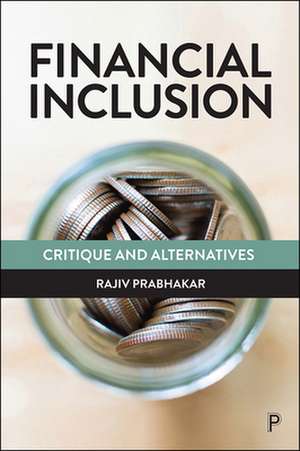Financial Inclusion – Critique and Alternatives
Autor Rajiv Prabhakaren Limba Engleză Paperback – 19 ian 2021
| Toate formatele și edițiile | Preț | Express |
|---|---|---|
| Paperback (1) | 290.79 lei 3-5 săpt. | |
| Bristol University Press – 19 ian 2021 | 290.79 lei 3-5 săpt. | |
| Hardback (1) | 773.51 lei 6-8 săpt. | |
| Bristol University Press – 19 ian 2021 | 773.51 lei 6-8 săpt. |
Preț: 290.79 lei
Nou
Puncte Express: 436
Preț estimativ în valută:
55.64€ • 60.63$ • 46.89£
55.64€ • 60.63$ • 46.89£
Carte disponibilă
Livrare economică 02-16 aprilie
Preluare comenzi: 021 569.72.76
Specificații
ISBN-13: 9781447355939
ISBN-10: 1447355938
Pagini: 178
Ilustrații: 2 Tables, black and white
Dimensiuni: 199 x 235 x 11 mm
Greutate: 0.3 kg
Editura: Bristol University Press
ISBN-10: 1447355938
Pagini: 178
Ilustrații: 2 Tables, black and white
Dimensiuni: 199 x 235 x 11 mm
Greutate: 0.3 kg
Editura: Bristol University Press
Notă biografică
Rajiv Prabhakar is Senior Lecturer in Personal Finance at the Open University and Senior Fellow of the Higher Education Academy.
Cuprins
What is financial inclusion? Financial capability: citizens or subjects? Financial inclusion and saving The case of housing Alternatives Conclusion
Descriere
Rajiv Prabhakar brings together the typically exclusive views of supporters and critics to present a nuanced, critical analysis of 'financial inclusion'. Addressing issues including the 'poverty premium', financial capability and housing, this dialogue advances crucial public, academic and policy debates and proposes alternative paths forward.
